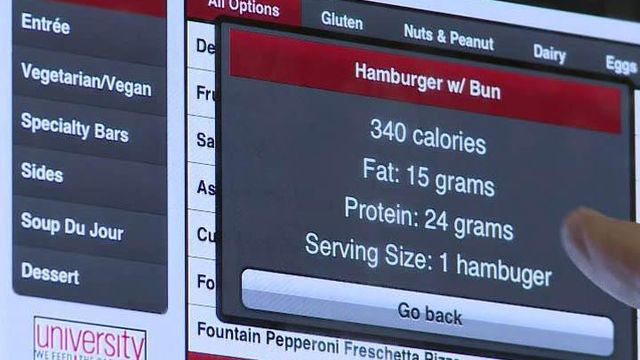Despite 'freshmen 15' myth, NCSU promotes healthy choices
During the first weeks college freshmen are on campus, their diet is often at the bottom of a list of concerns a mile long. By the end of that first year, however, it's usually a different story.
Posted — UpdatedBy then, students have packed on the dreaded "freshmen 15," the magical weight gain number most assume is true.
In fact, the number for the majority of college freshmen is closer to three or four pounds. A far cry from 15, but still something worth watching, especially considering the fact that 4 pounds a year for an entire college career can quickly become 15 to 20 pounds.
To help promote healthy eating choices, registered dietitians at North Carolina State University are using technology to teach students.
In Fountain Cafeteria on NC State's main campus, an iPad app and codes on each buffet item let students know exactly how many calories they're eating for each meal. Placement of food in the cafeteria also matters.
"If they touch on an entre, like a hamburger on a bun, it shows the calories," Lisa Eberhart, a registered dietitian, said. "When you first walk in, the first thing you see is fruits and vegetables."
Each line offers low-calories choices and popular, less healthy items, such pizza.
For students not interested in counting calories, experts recommend the plate method.
"With the plate method, half of what you eat for lunch or dinner should be low-calorie vegetables," Rex Wellness dietitian Diane Danchi said. "Then a quarter is healthy protein and a quarter healthy starch."
Danchi says vegetables make students feel fuller and whole grain help them stay that way for longer.
"We know it helps manage weight and prevent chronic disease," Danchi said.
On top of diet concerns, college students need to be more aware of their sleeping habits and exercise routines. Students need 7 to 8 hours of sleep every night and should try to exercise at least three times a week.
• Credits
Copyright 2024 by Capitol Broadcasting Company. All rights reserved. This material may not be published, broadcast, rewritten or redistributed.






